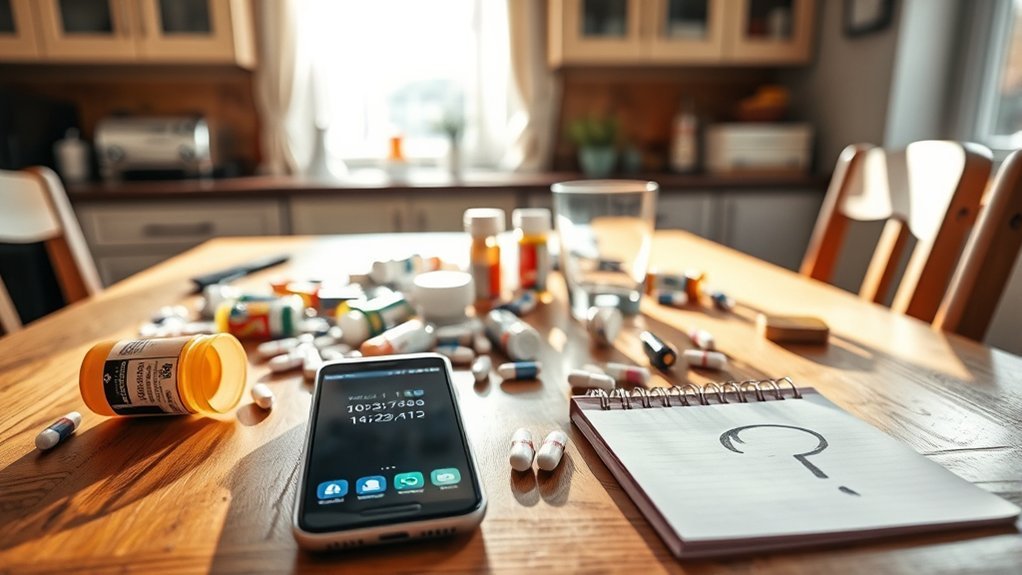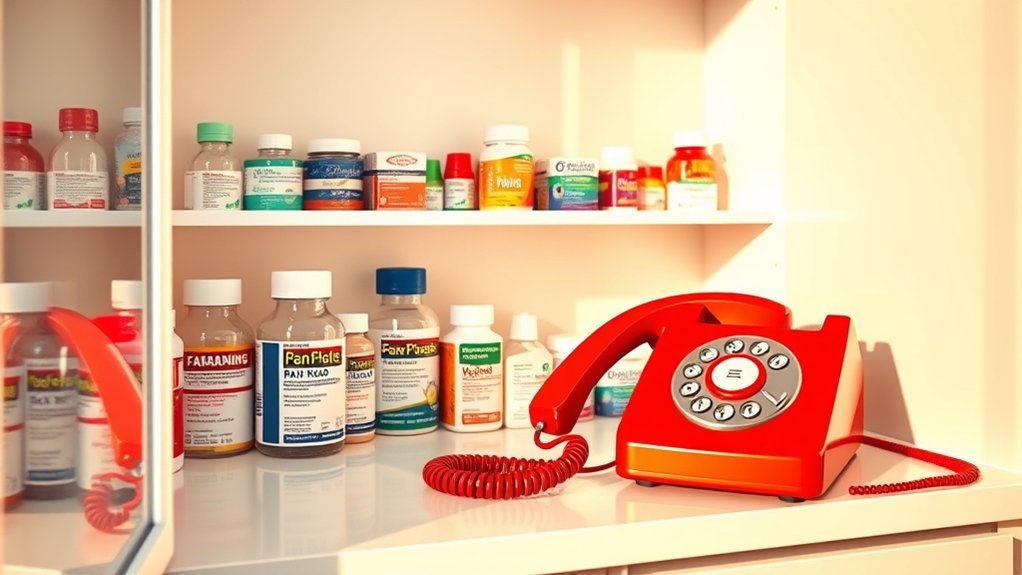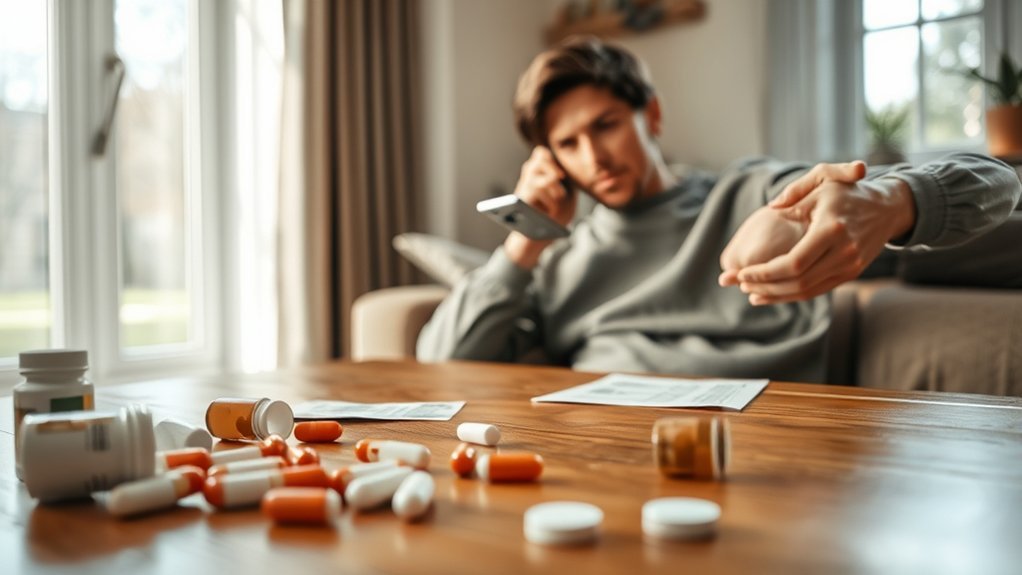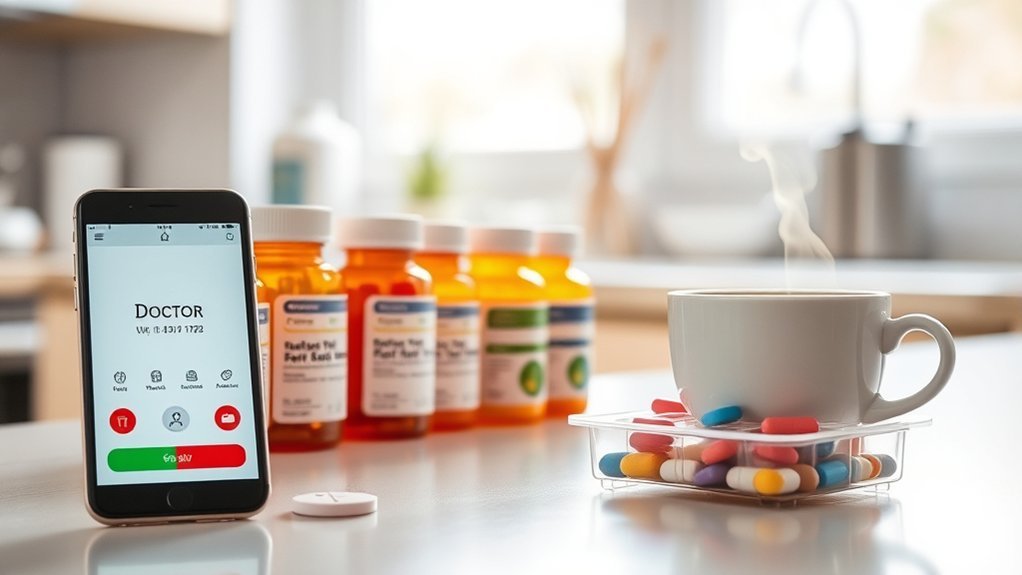Taking medications can be a straightforward process, yet it can also lead to unexpected complications. Knowing when to call a doctor is essential for your safety and health. If you notice any troubling side effects or unusual symptoms after starting a new medication, understanding how to respond can make all the difference. Let’s explore the signs that warrant a call to your healthcare provider and how to effectively communicate your concerns.
Understanding Safe Medication Practices

When it comes to managing your health, understanding safe medication practices is vital. Always read labels carefully, paying attention to dosage instructions and potential side effects.
Understanding safe medication practices is essential for effective health management; always read labels for dosage and side effects.
It’s important to keep a detailed list of all medications you take, including over-the-counter drugs and supplements, to avoid harmful interactions. Never share prescription medications with others, as they’re tailored for individual needs.
If you’re unsure about a medication, consult your healthcare provider or pharmacist for guidance. Store medications in a cool, dry place, away from children.
Always dispose of expired or unused medications properly to prevent accidental ingestion. By following these practices, you can guarantee that your medication regimen is safe and effective, ultimately supporting your overall well-being.
Common Over-the-Counter Medications

While many people rely on over-the-counter (OTC) medications for common ailments, it’s essential to understand their uses and potential risks. OTC medications, like acetaminophen for pain, ibuprofen for inflammation, and antihistamines for allergies, can effectively relieve symptoms.
You might also consider cough suppressants for colds or antacids for indigestion. However, it’s vital to read labels carefully, as dosages and ingredients vary. Some OTC medications can interact with prescription drugs or exacerbate existing health conditions.
Always consult a healthcare professional if you’re unsure about which medication to choose, especially if you’re pregnant, nursing, or caring for children. Being informed will help you use OTC medications safely and effectively, ensuring better health outcomes.
Recognizing Side Effects and Allergic Reactions

Recognizing side effects and allergic reactions is essential for ensuring your safety when using medications. Side effects can range from mild symptoms like nausea and dizziness to more serious issues such as rapid heartbeat or severe headaches.
Pay attention to how your body reacts after taking a new medication, and keep track of any changes. Allergic reactions may include hives, swelling, or difficulty breathing, which can be life-threatening.
If you notice any unusual symptoms after starting a medication, it’s vital to document these changes. Always read the medication guide for potential side effects and be aware of your medical history.
Being proactive about recognizing these issues can help you stay safe and make informed decisions about your health.
When to Seek Medical Advice
Noticing unusual symptoms after taking medication warrants prompt attention and can signal the need for medical advice. It’s vital to recognize when to reach out to your healthcare provider.
Consider seeking medical advice if you experience:
- Severe or Persistent Side Effects: If symptoms like nausea, dizziness, or headache don’t improve or worsen.
- Signs of an Allergic Reaction: Symptoms such as rash, itching, swelling, or difficulty breathing require immediate attention.
- Interactions with Other Medications: If you notice unexpected changes in your health after starting a new medication alongside existing prescriptions.
Taking these steps can help you address potential issues early and guarantee your treatment remains safe and effective.
Don’t hesitate to call your doctor; your health is the priority.
Tips for Communicating With Your Doctor
How can you guarantee that your communication with your doctor is effective and productive? Start by preparing a list of your symptoms, medications, and any concerns you have before your appointment.
Be clear and concise when describing your issues; use specific examples to illustrate your points. Don’t hesitate to ask questions if you don’t understand something. It’s essential to clarify any medical terms or instructions.
Additionally, take notes during your visit to help you remember important information. If you’re given a treatment plan, confirm that you comprehend it fully.
Finally, follow up with your doctor if your symptoms persist or worsen. Open and honest communication fosters a stronger doctor-patient relationship, ensuring you receive the best care possible.
Frequently Asked Questions
Can I Take Medications Past Their Expiration Date?
You shouldn’t take medications past their expiration date. While some might still be effective, safety can’t be assured. It’s best to consult a healthcare professional for alternatives and make certain you’re using medications safely.
How Should I Store My Medications Safely?
Storing medications safely isn’t rocket science, but it sure feels like it sometimes! Keep them in a cool, dry place, away from sunlight and moisture. Always use original containers and label them clearly for safety.
What Should I Do if I Miss a Dose?
If you miss a dose, take it as soon as you remember, unless it’s almost time for your next dose. In that case, skip the missed dose and resume your regular schedule. Don’t double up.
Are There Specific Foods to Avoid With Certain Medications?
Think of medications as plants; they thrive with the right nutrients. Certain foods can hinder their effectiveness, like grapefruit with statins. Always check with your doctor or pharmacist before mixing meals and medications for ideal health.
How Can I Safely Dispose of Unused Medications?
To safely dispose of unused medications, take them out of their original containers, mix with an unpalatable substance like coffee grounds, seal in a bag, and throw it in the trash. Avoid flushing them down the toilet.
Conclusion
Charting the world of medications can feel like sailing uncharted waters. To guarantee a safe journey, always keep an eye on the horizon for any signs of trouble, like unexpected side effects or worsening health. If storms arise, don’t hesitate to reach out to your healthcare provider—your guiding star. Remember, open communication is your compass, steering you toward safe medication practices and a healthier life. Stay vigilant, and let your well-being chart the course ahead.
